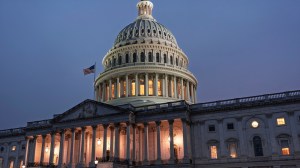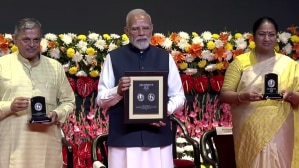India not to accede to US pressure on nuclear issue
NEW DELHI, JAN 28: India will not accede to US pressure on adopting nuclear or missile restraint, the core issue in the ongoing talks bet...

NEW DELHI, JAN 28: India will not accede to US pressure on adopting nuclear or missile restraint, the core issue in the ongoing talks between Washington and New Delhi, of which the seventh round begins here tomorrow.
Asked whether India would be restrained in the testing of its missiles as demanded by the US, External Affairs Minister Jaswant Singh said today, “India is a restrained country. I want to understand what they mean by restraint.”
Singh leads the country over two days of strategic talks with US deputy secretary of state Strobe Talbott and his team, who arrive here tomorrow morning. Talbott goes on from here to Pakistan for discussions on February 2-3.
Highly placed sources in the Government say that even as Washington seems to have, albeit unwillingly, come to accept a nuclear India, it is sorely keen that India begins to voluntarily use the phrase “strategic restraint” in its exchanges with its key interlocutors.
Rejecting outright the US demand, the sources said that New Delhi waswilling to show flexibility on the nuclear dialogue with all those it was engaged with, but not at the cost of national security.
“We have been restrained for so many years. We have never exported sensitive technologies to any other country, despite requests to do so. The Prime Minister has announced that India will not conduct any more tests. But we live in a hostile security environment and must continue with our programmes,” the sources said.
The sources rejected reports that New Delhi had put off testing of a missile in the last week under US pressure, explaining that because of some technical snags that appeared in preparation, the test flight had to be abandoned.
They pointed out that once these snags were corrected, the indigenous missile programme would carry on.
Meanwhile, both Singh and Talbott will settle down tomorrow and the day after in a renewed attempt to “harmonise” their respective positions on issues like the Comprehensive Test Ban Treaty (CTBT), the production of fissilematerial and the development and deployment of India’s missiles.
New Delhi says it is “quite happy” to sign the CTBT, but on the condition that the US lifts all the economic sanctions it imposed after the tests. “We cannot sign the CTBT unless all the economic sanctions are removed,” the sources said. In October, Washington lifted all the sanctions against Pakistan, but kept those related to World Bank funding vis-a-vis India.
New Delhi’s strategy on CTBT signature is likely to be broken up into two-three parts: signature, ratification and deposition of the instrument of ratification.
In the run up to September, India is likely to sign on, but will wait for the US Congress to ratify its own signature to the CTBT before New Delhi does so here. Depositing the instrument of ratification then, becomes a mere formality.
Meanwhile, the Congress today asked the Centre to spell out what it proposed to achieve in the current round of talks with the US. Party spokesman Ajit Jogi said that the previous sixrounds of discussions between Singh and Talbott had failed.
Nothing concrete had so far emerged on the nuclear issue, Jogi said, demanding that the country and the Opposition parties be taken into confidence on what the government proposed to achieve in this round.



- 01
- 02
- 03
- 04
- 05




























